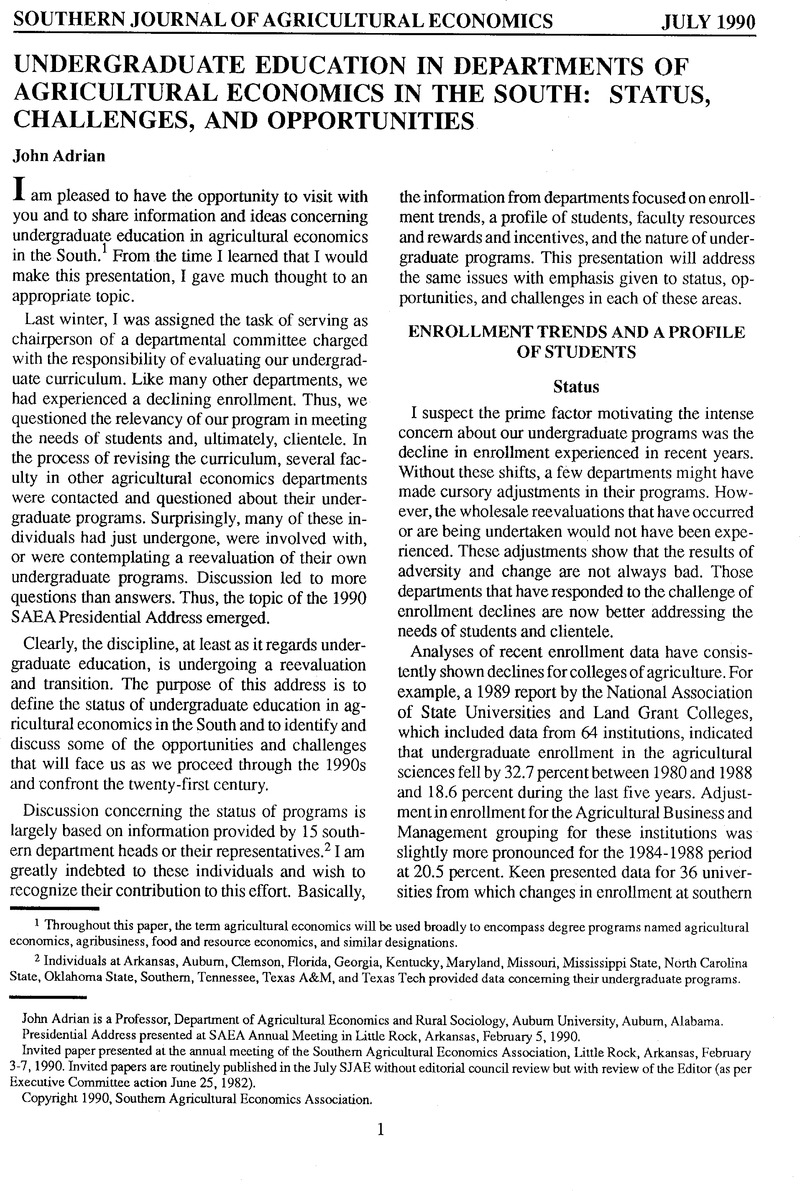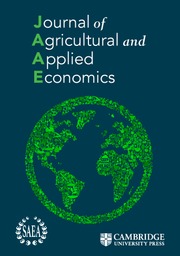No CrossRef data available.
Article contents
Undergraduate Education in Departments of Agricultural Economics in the South: Status, Challenges, and Opportunities
Published online by Cambridge University Press: 09 September 2016
Abstract
An abstract is not available for this content so a preview has been provided. Please use the Get access link above for information on how to access this content.

- Type
- Presidential Address
- Information
- Copyright
- Copyright © Southern Agricultural Economics Association 1990
References
Adrian, , John, and Dunkelberger, John. “Undergraduate Education at Southern Land-Grant Universities: The Agricultural Economics Graduates' Perspective.” unpublished paper presented at Southern Agricultural Economics Meeting, February 4-7,1990, Little Rock, Arkansas.Google Scholar
Erven, , Bernard, L. “Reforming Curricula: Challenge and Change for Agricultural Economists.”
Am. J. Agr. Econ., 69:5 (1987):1037–1042.Google Scholar
Gelinas, , Douglas, A. “To Survive, Agricultural Colleges May Need to Abandon Their Undergraduate Programs.” The Chronicle of Higher Education, April 13, 1988:A56.Google Scholar
Keen, , Robert, C. “Promoting Agricultural Careers and Curriculums (A Basic Understanding of Where We Are and How We Should Respond: A White Paper).” Paper presented by Agricultural Industry Group, American Society of Training and Development at Annual Convention, Boston, MA, June 6, 1989.Google Scholar
Kohl, , David, M., Broder, Josef M., and Rapole, Michelle L.. “Why Should Agricultural Economics Undergraduate Programs Exist?” paper presented to the AAEA Teaching Workshop, Baton Rouge, LA, July 29, 1989.Google Scholar
Lewis, , Robert, . “Changing Market Sends More Adults Off to Campuses.” The Birmingham News, January 7, 1990:5C.Google Scholar
Litzenberg, , Kerry, K. and Schneider, Vernon E.. “A Profile of Tomorrow's Agribusiness Leaders: The U.S. Perspective.”. Agribusiness: An International Journal, 5:3(1989):249–258.Google Scholar
Manderscheid, , Lester, V. “Undergraduate Educational Opportunities in the Face of Declining Enrollments.” Am. J. Agr. Econ., 70:5(1988):985–993.CrossRefGoogle Scholar
Peterson, , Paul, E. “Critiques of Higher Education-A Review.”
National Forum: The Phi Kappa Phi Journal, Spring, 1988:35–38.Google Scholar
RICOP Committee, Division of Agriculture, NASULGC. “Fall 1988 Enrollment in National Association of State Universities and Land Grant Colleges of Agriculture.” June, 1989.Google Scholar
Roth, , John, K. Book Review of ProfScam: Professors and the Demise of Higher Education, in National. Forum: The Phi Kappa Phi Journal, Summer, 1989.Google Scholar
Spitzer, , Robert, R. “America's Challenges of the Nineties.”
The President's Forum Series, Milwaukee School of Engineering, Milwaukee, WI, 1989.Google Scholar
Sykes, , Charles, J. ProfScam; Professors and the Demise of Higher Education. Washington, DC: Regnery Gateway, 1988.Google Scholar
Tevis, , Cheryl, . “Ag Schools Out-of-Step?” Successful Farmer,
87:12(November, 1989): 17.Google Scholar
The Task Force on Agriculture and Community Viability. Agriculture and Rural Viability. Experiment Station Committee on Organization and Policy, Cooperative State Research Service, 88-3, 1988.Google Scholar




